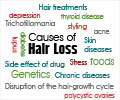Evidence in the form of a stress hormone in the hair of Peruvian individuals who lived between 550 A.D. and 1532 suggests that people in the past were very stressed out. scientists have said.
Evidence in the form of a stress hormone in the hair of Peruvian individuals who lived between 550 A.D. and 1532 suggests that people in the past were very stressed out. scientists have said.
According to a report in Discovery News, the study is the first to detect the stress hormone cortisol in ancient hair.Cortisol is produced in response to real and perceived threats. After its release, the hormone travels to nearly every part of the body, including to blood, saliva, urine and hair.
It now may be possible to determine not only how ancient people behaved, but also how they felt.
"Combined with archaeological reconstructions of past communities and societies, and traditional bioarchaeological approaches to understanding stress, health and well-being, research like this will significantly enrich our ability to reconstruct ancient life histories, and let us explore individualized experiences of people who died hundreds or even thousands of years ago," lead author Emily Webb told Discovery News.
Webb, a University of Western Ontario anthropologist, and her team measured cortisol in hair from 10 individuals buried at five different sites in Peru: Cajamarquilla, Leymebamba, Puruchuco, Tucume and Nasca.
The researchers also found the stress hormone in hair from early Ontario residents, ancient Nubians and early Egyptians, but the Peru residents were the focus of this study.air grows at a rate of about 0.4 inch per month, so depending upon the individual's hair length, the researchers were able to trace stress levels up to 27 months before the Peruvian people died.
Advertisement
For example, Webb said the stress could be because of "food availability, drought conditions and nutritional stress," along with reaction to actual or perceived threats "to physical or social integrity, i.e. to health, safety and well-being."
Advertisement
"A society serves as a protective buffer, and while our society effectively protects us from, for example, extreme year-to-year differences in food availability, as individuals, we still experience considerable stress in our lives for other reasons," she said.
Source-ANI
RAS















